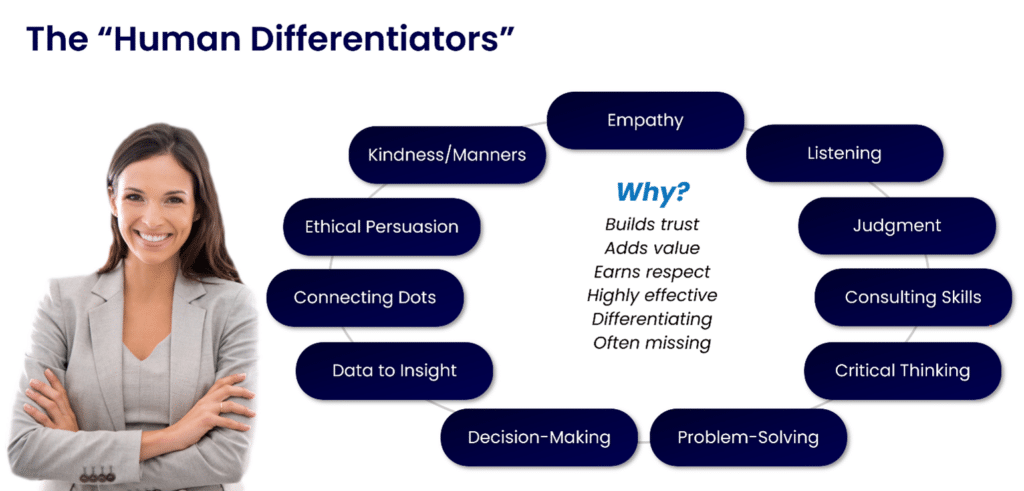Everywhere you turn, there’s talk of how AI is revolutionizing industries, making processes more efficient, and driving unprecedented levels of insight and automation. Many are eager to explore and incorporate AI into their sales strategies, seeing it as the key to staying competitive in a rapidly evolving market.
However, this enthusiasm for AI is often met with skepticism from experienced sellers and sales leaders who emphasize the importance of people and relationships. They argue that no amount of technology can replace the human touch, the nuanced understanding and the trust-building that are at the heart of successful sales interactions.
This tension between the push for AI and the pull towards human-centric skills sets the stage for a deeper discussion. While each side has valid points, the true power lies in combining these elements. By integrating AI with human differentiators, sales professionals can achieve a level of effectiveness and efficiency that neither could accomplish alone.
The Role of AI in B2B Selling
Artificial intelligence has revolutionized many aspects of the sales process. From automating repetitive tasks to providing deep insights through data analysis, AI empowers sales teams to focus on what truly matters — building relationships and closing deals. AI can analyze vast amounts of data to identify patterns and trends, predict customer behavior and provide personalized recommendations. This not only saves time but also enables sales professionals to make informed decisions and tailor their approach to each client.
Today, leading sales enablement software providers exemplify how AI can be leveraged to support B2B sales. My employer partners with a sales enablement software provider, Allego, who has infused its entire suite with AI capabilities.
Here are a few examples of those capabilities:
- Analyze sales calls, creating competency maps and identifying skill gaps.
- Correlate sales results with content, training and tool usage.
- Foster role-play practice with AI bots to improve skills.
- Select content to share with prospects and buyers based on an analysis of the situation.
- Provide feedback on role plays or calls using a scorecard rubric.
- Take notes for meetings and conduct call analyses.
- Author quizzes based on training content.
- Write practice drills or role-play scripts by analyzing real customer calls.
- Provide guided selling recommendations across multiple channels.
- Automate data entry for CRM.
This is not even everything. Mind-boggling, isn’t it? And this isn’t some fancy roadmap. This and more is available right now. These advanced capabilities go beyond generic AI use cases, showcasing the depth of AI’s potential in enhancing sales performance.
Research indicates that AI tools are making the sales process more efficient by taking over routine tasks that might take reps away from valuable time they can spend doing high-impact tasks. For example, AI can optimize the sales process with data-driven insights, such as sales forecasting, lead scoring and pipeline analysis. Generative AI tools, like ChatGPT, Microsoft Copilot, Perplexity AI, and Salesforce Einstein GPT are also being used to write sales content or prospect outreach messages, further streamlining the sales process.
AI in Wholesale Distribution
AI has some specific use cases for wholesale distribution that are intriguing and can enable more strategic and data-driven decision-making.
Here are a few possible applications:
- Strategic Pricing: AI can analyze vast amounts of data, including market trends, competitor pricing and customer behavior, to recommend optimal pricing strategies. This helps distributors maximize profits while remaining competitive.
- Data Analysis: AI can process and analyze massive datasets, such as freight data, transactional data, customer types and purchase patterns. This analysis provides insights that can drive more informed business decisions and identify opportunities for cost savings and efficiency improvements.
- Inventory Management: AI-driven predictive analytics can forecast demand with high accuracy, helping distributors optimize inventory levels, reduce overstocking or stockouts, and allocate resources efficiently. This ensures that the right products are available at the right time, improving customer satisfaction and reducing carrying costs.
- Identifying Opportunities: AI can identify upsell, cross-sell and new business development opportunities by analyzing customer purchase history and behavior. This enables sales teams to target the right customers with the right offers, increasing sales and customer loyalty.
- Supply Chain Optimization: AI can enhance supply chain management by predicting disruptions, optimizing routes and improving logistics planning. This leads to faster delivery times, reduced costs and a more resilient supply chain4.
- Customer Service: AI-powered chatbots and virtual assistants can provide 24/7 customer support, handling routine inquiries and freeing up human agents to focus on more complex issues. This improves response times and customer satisfaction.
Pretty cool, right? And this is just scratching the surface of the possibilities. If you’re interested in learning more and keeping abreast of the AI developments and how they impact distribution:
- Listen to this on-demand event replay of the takeaways from the last Applied AI for Distributors conference:
The Importance of Human Differentiators

While AI offers numerous benefits, it cannot replace the human touch. I refer to this as the Human Differentiators — skills such as empathy, active listening, ethical persuasion, critical thinking and more — are essential for building trust and fostering strong relationships with clients. These skills enable sales professionals to connect with clients on a deeper level, understand their needs and provide solutions that truly add value from the client’s perspective.
Empathy allows sales professionals to genuinely understand and share the feelings of their clients, creating a sense of connection and trust.
Active listening ensures that salespeople fully comprehend their clients’ needs and concerns, enabling them to respond appropriately and effectively.
Ethical persuasion involves influencing clients in a manner that is honest and respects their autonomy, which is crucial for maintaining long-term relationships.
Critical thinking helps sales professionals analyze complex situations, make informed decisions and solve problems creatively – critical for becoming a trusted advisor.
In a world where buyers are increasingly engaging sellers later in their buying journey, the ability to communicate effectively and demonstrate genuine understanding is more important than ever. Top salespeople leverage these human-centric skills to differentiate themselves from the competition and deliver outcomes that exceed buyer expectations.
Combining AI and Human Differentiators
The most powerful approach in B2B selling is to combine the strengths of AI with the irreplaceable value of human differentiators. AI can handle data-driven tasks and provide insights, while sales professionals focus on building relationships and delivering personalized solutions. This synergy allows for a more efficient and effective sales process, where technology enhances human capabilities rather than replacing them.
Sales professionals who are buyer-centric, consultative problem-solvers who deliver value from the customer’s perspective don’t need to fear being replaced by AI. They should be concerned about being replaced by another sales professional who maximizes AI.
By leveraging AI to handle routine tasks and provide insights, sales professionals can dedicate more time to understanding their clients’ needs and crafting tailored solutions. This combination of technology and human touch not only improves sales performance but also enhances the overall customer experience.
Closing Thoughts
The integration of AI and human differentiators is the key to success in B2B selling. AI can make sales teams more effective and efficient by automating tasks and providing valuable insights. However, the human touch—empathy, active listening, ethical persuasion and critical thinking — remains irreplaceable. By combining these elements, sales professionals can build stronger relationships, deliver better outcomes and thrive in the digital age.
Additional Reading:
Mike Kunkle is an internationally recognized expert on sales enablement, sales effectiveness, sales training, sales coaching, sales management, and sales transformations.
He’s spent over 30 years helping companies drive dramatic revenue growth through best-in-class enablement strategies and proven effective sales systems.
Mike is the founder of Transforming Sales Results, LLC where he designs sales training, delivers workshops, and helps clients improve sales results through a variety of sales effectiveness practices and advisory services.
He collaborated to develop SPARXiQ’s Modern Sales Foundations™ curriculum and authored their Sales Coaching Excellence™ and Sales Management Foundations™ courses.
Mike's book, The Building Blocks of Sales Enablement, is available on Amazon, with others coming soon in 2026, starting with The CoNavigator Method for B2B Selling.

